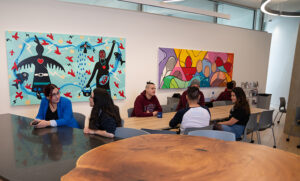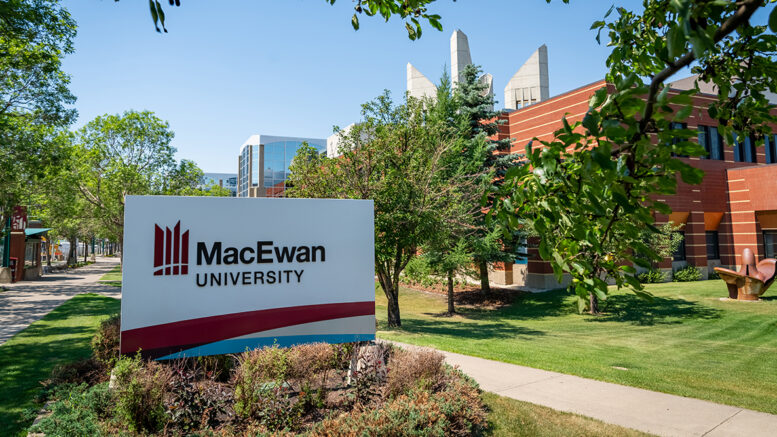by Regan Treewater-Lipes
(ANNews) – It is no secret that within academia, the valuable voices of Indigenous scholars are drastically underrepresented. The Canadian Association of University Teachers (CAUT) has noted that: “Post-secondary institutions have claimed for decades that they are committed to equity and diversity, but their principled stand still falls short.” According to CAUT, Indigenous faculty make up only 1.4% of the professorial workforce. Geographical complications exacerbate inequity for Indigenous communities as noted by Colleges and Institutes Canada’s 2024 citing of Statistics Canada’s 2023 report that found: “Adding to the complexity, Indigenous communities are disproportionately situated in rural and remote areas. In 2016, 26% of Indigenous individuals aged 19 to 45 lived in these regions, in stark contrast to just 3% of the non-Indigenous population.” This makes the leap of leaving home for university a monumentally intimidating prospect.
According to MacEwan University’s Associate Vice President of Indigenous Initiatives and Engagement, Terri Cardinal, there are inherent barriers that Indigenous scholars face when applying for academic positions. As an extension of these challenges, Indigenous university-hopefuls would certainly be more likely to feel empowered within academia, were they to see people like themselves represented within faculty, in fully integrated positions of achievement and respect.
Edmonton’s own, MacEwan University, is shattering this glass ceiling with a truly inclusive model for teaching excellence and meaningful student engagement. MacEwan’s student focused values and pursuit of teaching greatness have distinguished the institution as the ‘go to’ because of its smaller class sizes, and individualized support networks. More students are choosing MacEwan for their undergraduate journeys because they want an intellectually enriching experience where they will get the attention, personalized mentorship, and scholarly training they will need in the ‘real world.’

Students benefit from the kihêw waciston Indigenous Centre at MacEwan University in Edmonton. Photo supplied.
Part of this ‘real world’ practicality is the knowledge and skills directly transferrable to industry and professional careers: including an authentic ability to interpret one’s surroundings through non-Eurocentric lenses. This is why MacEwan is so excited to be recruiting applicants for an innovative position: “The Department of Biological Sciences in the Faculty of Arts and Science, in partnership with kihêw waciston Indigenous Centre, invites applications for a full-time tenure-track appointment at the rank of Assistant Professor.” There are currently cross appointments with kihêw waciston from the Faculty of Arts and Sciences (Anthropology), Faculty of Business, Faculty of Fine Arts, and the Faculty of Health and Community Studies, following a successful pilot cross-appointment program three years ago. When asked about how the original idea for cross-appointed positions was born, Cardinal noted that the cross-appointment is something specific to MacEwan.
In a recent interview with Alberta Native News, Department of Biological Sciences Chair, Professor Kimberley Harcombe, elaborated that this innovative opportunity will have potential benefits for anyone in the biological and environmental sciences.
“We have consulted with an Elder through kihêw waciston previously about how we can understand and incorporate Indigenous perspectives and approaches into our interactions with nature,” she explained. “But this appointment would do so much more.” According to the public posting: “Within the Department of Biological Sciences, both during the cross-appointment and after, this person would contribute to our collective pedagogical expertise through lived First Nations, Metis, or Inuit experiences to course development and student outreach. On top of this they would also enhance our community-based scholarly activity working collaboratively to contribute service to the University and the broader community.”
The position would be split between these responsibilities in the Department of Biological Sciences, and student engagement and mentorship at kihêw waciston. “The research component might not be traditional lab work, but potentially, depending on the expertise of the successful applicant, some kind of field work supervision of student projects.” Terri Cardinal noted that: “Specifically with the biology cross-appointment position, it’s really looking at Indigenous perspectives to science. Our Indigenous people are scientists, our ancestors were scientists. We know the concepts and have the practical knowledge of the scientific realm, but the language that we use is different.”
“We want to attract candidates with lived experience and knowledge, and we can’t approach this from the traditional Eurocentric perspective. This would reinforce barriers when the entire objective is to remove obstacles,” explained Harcombe.
The position is tenure-track, meaning that the successful candidate will have job-security, and the ability to rise through the ranks at a premier Alberta institution of higher learning. Since transitioning from a college to a university, MacEwan has often, but not always, advertised for professorial applicants to have a PhD in hand as a requirement for tenure-track positions.
“We reconsidered this when envisioning this position because a person with an MSc can easily have that valuable wealth of lived experience and knowledge from working directly with the land and nature in their community, and this is the expertise we need. Requiring everyone to have a PhD is a barrier that doesn’t need to be there,” Harcombe reiterated. The posting asks that applicants hold either a Master’s or PhD in biological or environmental studies. “We were careful not to be too narrow in our description of the position because we want to welcome science educators that come from different lived perspectives of biological and environmental Indigenous learning to find the best fit of our department and kihêw waciston.”
Cardinal emphasized that although it is about providing opportunities for Indigenous perspectives within academia, she and her team are also focused on properly supporting the successful applicant. “One of the things we recognize within cross-appointments and within Indigenous worldviews and prospectives is that Indigenous folks like to be connected to community: so, we need be asking how are we delivering support for new professors? How are we ensuring that we provide the Indigenous connection within this setting of a big academic institution, and how do we make sure that we are connecting to community as well? Many of us as academics are very much siloed and at kihêw waciston our work is outward looking.”
This is a novel concept in cross-appointments. A partnership between kihêw waciston and the laboratory sciences might seem strange at first; Harcombe reiterated Cardinal’s sentiments: “In biology we study life and what is living and growing around us. Indigenous communities have generations of gathered knowledge and learning about how to properly observe and interact with nature. Teaching MacEwan students how to engage with the natural world responsibly and from non-Eurocentric traditions will be incredibly beneficial to them professionally, but also for their personal enrichment. This will enhance the curriculum we are able to offer students tremendously.”
Harcombe did make sure to note that in no way would there be an expectation that the successful candidate act as an authority on all things Indigenous. “That would be a ridiculous ask,” she stated emphatically. Cardinal elaborated that: “The cross-appointments are also about providing support for professionals coming into the university. Often what happens is that we have Indigenous professors coming into faculties, and they’re the only Indigenous soul, the only Indigenous person there, and they’re pulled into every committee, they’re consulted on everything Indigenous, and then they must do a lot more work in their role as an Indigenous person. kihêw waciston provides additional support and resources so it’s not overwhelming, because ideally, we want to retain Indigenous profs when they come to MacEwan.” Through kihêw waciston there are collaborative opportunities between the cross-appointed professors, and no end to the growing sense of community and collaboration. Referencing a rising student population of approximately 1,100 Indigenous pupils at present, Cardinal added: “We are not only focused on engaging with Indigenous students, but we invite the public in here as well. We want the community in to view our space to ensure that we are creating relationships: fostering a sense of connection and belonging.”
The successful candidate would ultimately be instrumental in pioneering new and inspiring curriculum development informed by Indigenous teachings and the richness of generations of partnership with Mother Earth. MacEwan University has already enjoyed the valuable contributions from other cross-appointed professors, and now the Department of Biological Sciences eagerly awaits the chance to welcome a new member to their vibrant team. Interested biological and environmental scientists with lived Indigenous knowledge and experiences should definitely consider applying for this outstanding position.
Detailed information can be found on the MacEwan University website: Assistant Professor, Biology – MacEwan University. A review of applications will begin on November 18th and continue until a suitable candidate is found. Any questions can be directed to Kimberley Harcombe: [email protected].
Regan Treewater-Lipes is a Local Journalism Initiative Reporter.



Be the first to comment on "MacEwan U values Indigenous lived experience in innovative cross appointment positions"